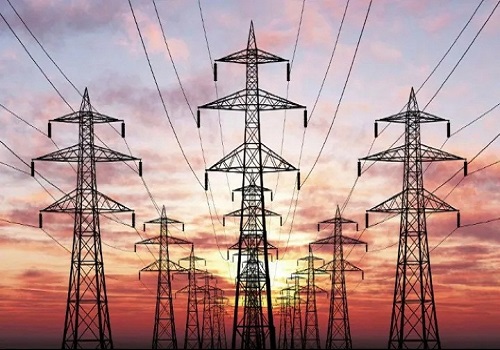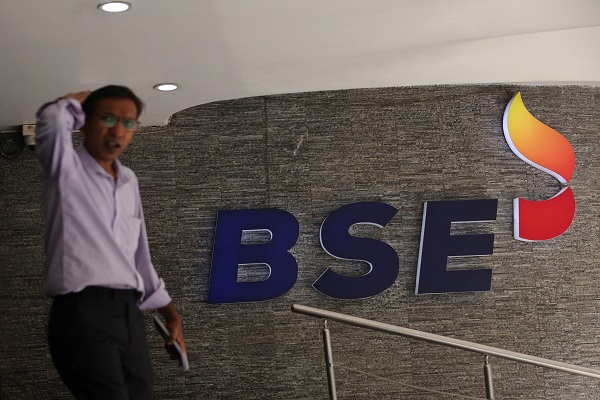Aegis Vopak Terminals coming with IPO to raise upto Rs 2951 crore

Aegis Vopak Terminals
- Aegis Vopak Terminals is coming out with a 100% book building; initial public offering (IPO) of 12,55,60,538 shares of Rs 10 each in a price band Rs 223-235 per equity share.
- Not more than 75% of the issue will be allocated to Qualified Institutional Buyers (QIBs), including 5% to the mutual funds. Further, not less than 15% of the issue will be available for the non-institutional bidders and the remaining 10% for the retail investors.
- The issue will open for subscription on May 26, 2025 and will close on May 28, 2025.
- The shares will be listed on BSE as well as NSE.
- The face value of the share is Rs 10 and is priced 22.30 times of its face value on the lower side and 23.50 times on the higher side.
- Book running lead managers to the issue are ICICI Securities, BNP Paribas, IIFL Capital Services, Jefferies India and HDFC Bank.
- Compliance Officer for the issue is Priyanka Sunil Vaidya.
Profile of the company
Aegis Vopak Terminals is the largest Indian third-party owner and operator of tank storage terminals for liquified petroleum gas (LPG) and liquid products in terms of storage capacity, as of December 31, 2024. It owns and operates a network of storage tank terminals having an aggregate storage capacity of approximately 1.50 million cubic meters for liquid products and 70,800 metric tons (MT) of static capacity for LPG as of December 31, 2024, and offer secure storage facilities and associated infrastructure for liquids such as petroleum, vegetable oil, lubricants, and various categories of chemicals and gases such as LPG (including propane and butane). It has the largest storage capacity in India’s LPG tank storage sector, contributing to approximately 11.50% of the total national static capacity, as of December 31, 2024.
In terms of storage of liquid products, it is the largest third-party tank storage company in India, contributing to approximately 25.53% of India’s third-party liquid storage capacity as of December 31, 2024. As of December 31, 2024, the company has a diversified network of terminals spread strategically across five key ports in operation on the West and East coast of India. These key ports together handle approximately 23.00% of liquid and 61.00% of total LPG import volumes in India. At these terminals, it owns and operates facilities for different functions including product storage tanks, firefighting facilities, self-owned pipelines connected to jetty, ship loading and unloading infrastructure, as well as infrastructure for product evacuation by ship, rail, road and pipelines.
Proceed is being used for:
- Repayment or prepayment of all or a portion of certain outstanding borrowings availed by the company
- Funding capital expenditure towards contracted acquisition of the cryogenic LPG terminal at Mangalore
- General corporate purposes
Industry Overview
As per the usage-based classification, chemicals can be grouped into basic chemicals and petrochemicals and specialty chemicals. Basic chemicals and petrochemical intermediates are used to produce the finished products, which serve specific purposes. The finished products include polymers (synthetic fibres, synthetic rubbers, performance plastics) or other specialty chemicals (colorants, agrochemicals, surfactants, textile chemicals, construction chemicals and polymer additives). Specialty chemicals are a critical input for a range of industries and they are low in volume but high in value. Ocean transport through ships is the most prevalent and cost-effective mode of chemical movement. Other modes are ISO tank containers or general purpose (GP) containers. Liquid chemicals transported through chemical ships are typically stored in tank farms located at port terminals, before transporting to hinterland locations for respective end-user industries.
Meanwhile, Chemicals are classified into different types based on their flash points, which determine their flammability and the specific storage requirements for safe storage. A typical tank farm at port has a collection of different tank types capable of handling various liquids as per end user requirements. Specific treatments such as compressed air, nitrogen flushing, etc may be required before reuse of tanks. Tank farm terminals can be industrial terminals or those built by operators.
Industrial terminals typically serve multiple plants at the same time under long-term contracts, where the customer provides land and terminals can be constructed on a build, hold and operate basis. These terminals offer customised storage infrastructure for multiple production units in a manufacturing cluster such as petrochemical crackers, chemical plants and refineries, which are connected to the industrial terminal through pipelines for inward and outward product flows. These terminals provide benefits of economy of scale, optimisation of operating expenses and reduction of risk footprint associated with storage and product logistics.
Pros and strengths
India’s largest third-party owner and operator of tank storage terminals for LPG and liquid products: It is the largest Indian third-party owner and operator of tank storage terminals for LPG and liquid products in terms of storage capacity, as of December 31, 2024. It has the largest storage capacity in India’s LPG tank storage sector, contributing to approximately 11.52% of the total national static capacity, as of December 31, 2024. In terms of storage of liquid products, it is the largest third-party tank storage company in India, contributing to approximately 25.53% of India’s third-party liquid storage capacity as of December 31, 2024.
Strategically located necklace of terminals across the Indian coast: As of December 31, 2024, the company has a diversified network of terminals spread strategically across five key ports in operation on the West and East coast of India. These key ports together, handle approximately 23.00% of liquid and 61.00% of total LPG import volumes in India, enabling efficient distribution and affording accessibility to its customers. Further, it owns and operates two LPG storage terminals across two Indian ports, and 18 liquid storage terminals across six Indian ports. The location of storage terminals at specific ports is a major differentiator in the terminalling business, and storage terminals at ports that are closer to major shipping routes enjoy a competitive advantage as shipping from those ports will help importers and exporters save cost. Its terminals are located at ports which create a unique ‘necklace of terminals’ that enables it to cater to storage requirements in different regions across India.
Relationships with diversified customer base: The company has been able to build relationships with a diverse range of customers, partially built on the foundation of its promoter, Aegis’, years of operations. Aegis has established long-standing relationships with several Indian and global customers in course of its operations of over five decades. Consequently, it has been able to inherit these long-standing relationships to develop its own customer base. Through its strategic locations, distinct from Aegis and complementing its offerings, it has been able to procure business from Aegis’ customers, who it continues to service. As of December 31, 2024, it has a diversified customer base of over 400 customers including major national OMCs.
Focus on sustainability and health and safety: The company is committed to ESG principles, and its business operations are guided by its aim of sustainably optimizing financial outcomes while protecting the environment and contributing to community development. Its promoters have outlined a 'sustainability vision' that it strives to implement consistently in course of its business and operations. To this effect, it has developed a comprehensive sustainability framework factoring in key principles of various national and international guidelines. Its focus on ESG is facilitated by its promoters' respective commitments towards ESG, for which they have been recognized and rated.
Risks and concerns
Maximum revenue comes from limited customers: The company derived 42.07%, 44.56%, 47.20% and 44.76% of its revenue from its top 10 customers in the last in Fiscal 2023 and 2024 and in the nine months ended December 31, 2023 and 2024, respectively. Any deterioration of their business, substantial reduction in their dealings with it or a loss of any of these customers could have an adverse effect on its business, results of operations, financial condition and cash flows.
Geographical constrain: The majority of its terminals are situated across the west coast of India. It generated 91.61%, 92.28%, 91.31% and 92.82% in Fiscal 2023 and 2024 and in the nine months ended December 31, 2023 and 2024, respectively. As it derives a substantial portion of its revenue from terminals located along the west coast of India, its operations at these terminals are susceptible to local and regional factors, such as weather conditions, natural disasters, government policies, political developments and other unforeseen events and circumstances. Other than disruption at its Kandla terminal in 2023 on account of the Biparjoy Cyclone, it has not faced any significant disruptions in its terminals located across the west coast of India in the past nine Fiscals, and the nine months ended December 31, 2024. Such disruptions in the future could adversely impact its business, financial condition, results of operations and cash flows.
Limited operating history: The company entered into business transfer agreements, each dated November 30, 2021, effective from May 20, 2022, with one of its Promoters, Aegis, to acquire its LPG and liquid storage business at Kandla, and liquid storage business at Pipavav, Mangalore and Haldia. In addition, the company entered into a business transfer agreement dated November 30, 2021, effective from May 20, 2022, with one of its Promoter Group entities, Aegis Gas LPG Private Limited, to acquire its LPG storage business at Pipavav. As such, it has only limited operating results to demonstrate its ability to operate its business on which a potential investor may rely to evaluate its business and prospects. As such, it is also subject to the business risks and uncertainties associated with any new business, including the risk that it will not achieve its operating objectives and business strategy.
Stiff competition: The industry continues to be highly competitive. In addition, it may encounter consolidation in the markets in which it operates. The company’s competitors may have longer operating histories, larger customer bases and greater financial, sales and marketing, manufacturing, technical and other capabilities than it does. These competitors may be able to adapt more quickly to changes in customer and/or regulatory requirements. Existing or new competitors may offer storage services that more effectively address its markets with enhanced features and functionality, greater levels of integration and at lower costs. It may not be able to continue to compete successfully against current or new competitors. If it fails to compete successfully, it may lose market share in its existing markets, which could have an adverse effect on its business, financial condition and results of operations.
Outlook
Aegis Vopak Terminals Limited (AVTL) is a company that owns and operates storage terminals for liquefied petroleum gas (LPG) and various liquid products. The company operates two LPG storage terminals and 16 liquid storage terminals located across five major ports in India. These terminals handle coastal shipping, imports, and exports. On the concern side, the company derived significant revenue from its top 10 customers and any deterioration of their business, substantial reduction in their dealings with it or a loss of any of these customers could have an adverse effect on its business, results of operations, financial condition and cash flows. Moreover, the majority of its terminals are situated across the west coast of India and any adverse developments affecting its operations in such region, could have an adverse impact on its business, financial condition, results of operations and cash flows.
The issue has been offering 12,55,60,538 shares in a price band of Rs 223-235 per equity share. The aggregate size of the offer is around Rs 2800.00 crore to Rs 2950.67 crore based on lower and upper price band respectively. Minimum application is to be made for 63 shares and in multiples thereon, thereafter. On performance front, revenue from operations increased by 58.99% to Rs 5,617.61 million in Fiscal 2024 from Rs 3,533.32 million in Fiscal 2023, as a result of an increase in revenue from the liquid and gas terminal divisions. Moreover, restated profit for the year was Rs 865.44 million in Fiscal 2024 compared to a loss of Rs 0.75 million in Fiscal 2023.
Household segment and robust industrial consumption are expected to raise overall LPG demand to 36-37 MMTPA by Fiscal 2029, at a CAGR of 3-4%. The demand will largely be met through imports; as domestic supply is unlikely to keep pace with the projected demand. To cater to the storage infrastructure requirements for gas, the company has initiated construction in Fiscal 2023 of a greenfield LPG terminal at New Mangalore port in Karnataka with cryogenic static storage capacity of 82,000 MT. In addition, the company is expanding its presence in the Pipavav Terminal with an LPG cryogenic facility with a static storage capacity of 48,000 MT. These terminals are being designed to handle a maximum throughput of 6 MMTPA and 4 MMTPA, respectively.
























